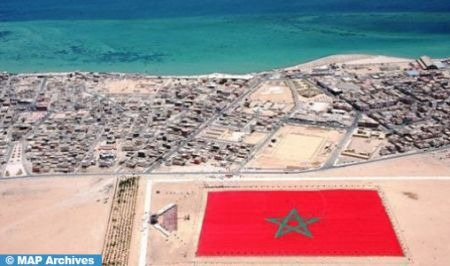Moroccan Sahara: Autonomy Plan, Solution Safeguarding Maghreb’s Future – Maghreb forum –
Participants in a Maghreb Forum, held Thursday evening in Laayoune, stressed the relevance of the autonomy plan in the southern provinces as a solution that will guarantee the final settlement of the artificial conflict around the Moroccan Sahara as well as safeguard the future of the Maghreb and its peoples. At this meeting, initiated by the Sahara Democracy and Human Rights League (LSDDH) as part of the commemoration of the 80th anniversary of the presentation of the Independence Manifesto, a host of journalists, researchers and associations from the Maghreb countries, underlined that the autonomy plan, which garners growing international support, represents an opportunity to put an end once and for all to the dispute over the Moroccan Sahara that Algeria has fabricated, and also to turn the Maghreb region into an area of progress and shared prosperity. They called for promoting closer ties between the peoples of the region, rejecting divisive rhetoric and abandoning counterproductive policies that are mortgaging the region’s economic and social future, pointing the finger at Algeria as the main player hindering development in the Maghreb. The speakers also pointed out that Maghreb peoples disapprove the division and discord climate that reigns in the region, highlighting the deep ties that unite them and the common dream of completing the construction of the Maghreb. In this context, the panelists called for building an integrated and united Maghreb area as well as strengthening the unity of its peoples, noting that unity and joint efforts are key to address social, economic and political challenges. Taking the floor on this occasion, LSDDH President, Hamada Labihi, said that the major obstacle to promoting Maghreb unity and development remains the conflict around the Moroccan Sahara, noting that the peoples of the region and the populations held against their will in the Tindouf camps are paying a heavy price for the persistence of this dispute. Labihi also pointed out that the Kingdom has committed itself seriously and credibly to seeking a definitive solution to this dispute, by putting on the negotiating table the autonomy plan which grants broad prerogatives to the elected representatives of the southern provinces, within the framework of national sovereignty, in order to enable the people of the Moroccan Sahara to manage their own affairs, assuring that the implementation of this Plan will undoubtedly contribute to making the dream of Maghreb unity a reality. For his part, Algerian journalist Oualid Kebir underlined that the autonomy plan proposed by Morocco in 2007 is a serious and credible solution which, in addition to settling the Sahara issue, also helps to strengthen the region’s stability and progress. Kebir, also President of the Maghreb Association for Peace, Cooperation and Development, explained that the Moroccan autonomy plan is not only a solution to the long-running dispute over the Sahara, but also a real opportunity for the Maghreb region, which aspires to greater integration and progress. “As Maghrebans, we can only commit ourselves to the same approach, because it is our duty to assume our responsibility to settle this dispute in the near future and achieve the dream so cherished by our peoples of a strong and stable Maghreb Union”, he maintained. For his part, former Minister in charge of relations with the Assembly of People’s Representatives and spokesman for the Tunisian Government, Khaled Chouket, stressed that “Maghreb unity is not just a choice, but a strategic necessity”, adding that Maghreb peoples are united by ties of history, culture, religion and geography, and driven by a firm determination to build an exemplary partnership that would safeguard the supreme interests of their countries. Maghreb unity is of crucial importance today in view of the current regional and international challenges, he argued, calling for promoting and creating synergy between Maghreb economies by taking advantage of their complementarity. Chouket also dwelt on the obstacles standing in the way of the dream of a Maghreb Union, in particular the dispute over the Moroccan Sahara, welcoming the relevance of the Moroccan autonomy plan as a realistic and credible solution to put an end to this artificial conflict. The same view was expressed by Ahmadou Ouled Oubeid, a Mauritanian politician, who stressed the need to relaunch the Greater Maghreb and overcome the difficulties blocking its construction through a strong regional economic momentum based on a win-win partnership. He also praised the socio-economic projects launched for the people of the southern provinces and the achievements made in various fields in this region. On this occasion, the participants welcomed Morocco’s election to the presidency of the United Nations Human Rights Council for 2024, seeing it as recognition by the international community of the far-sighted vision of His Majesty King Mohammed VI in protecting and promoting human rights.

